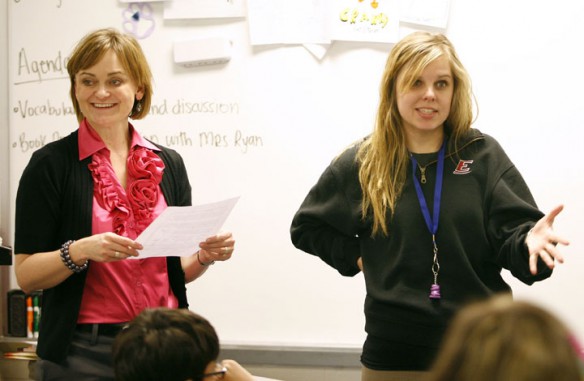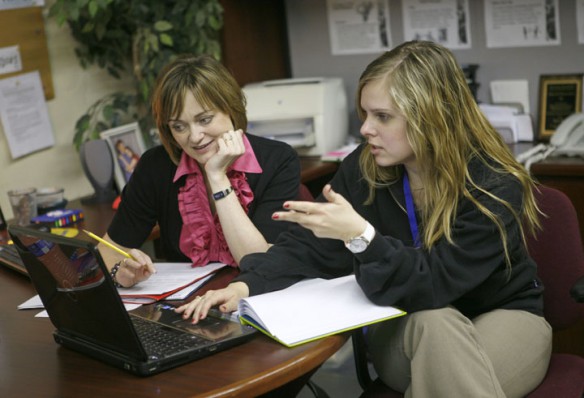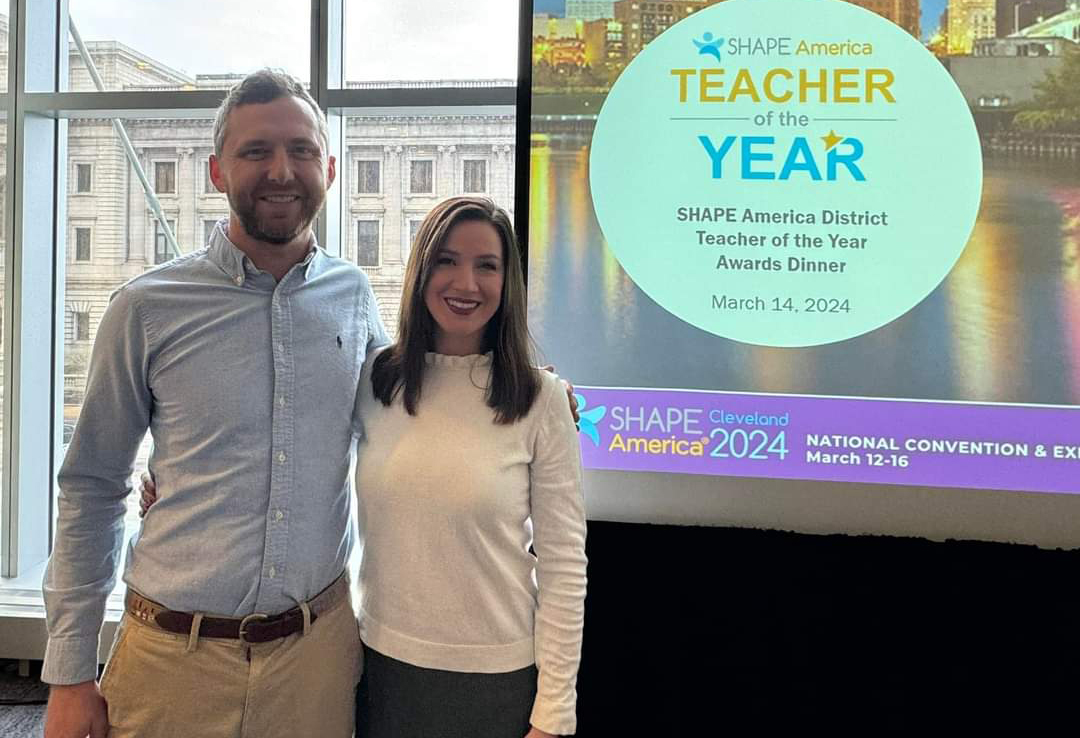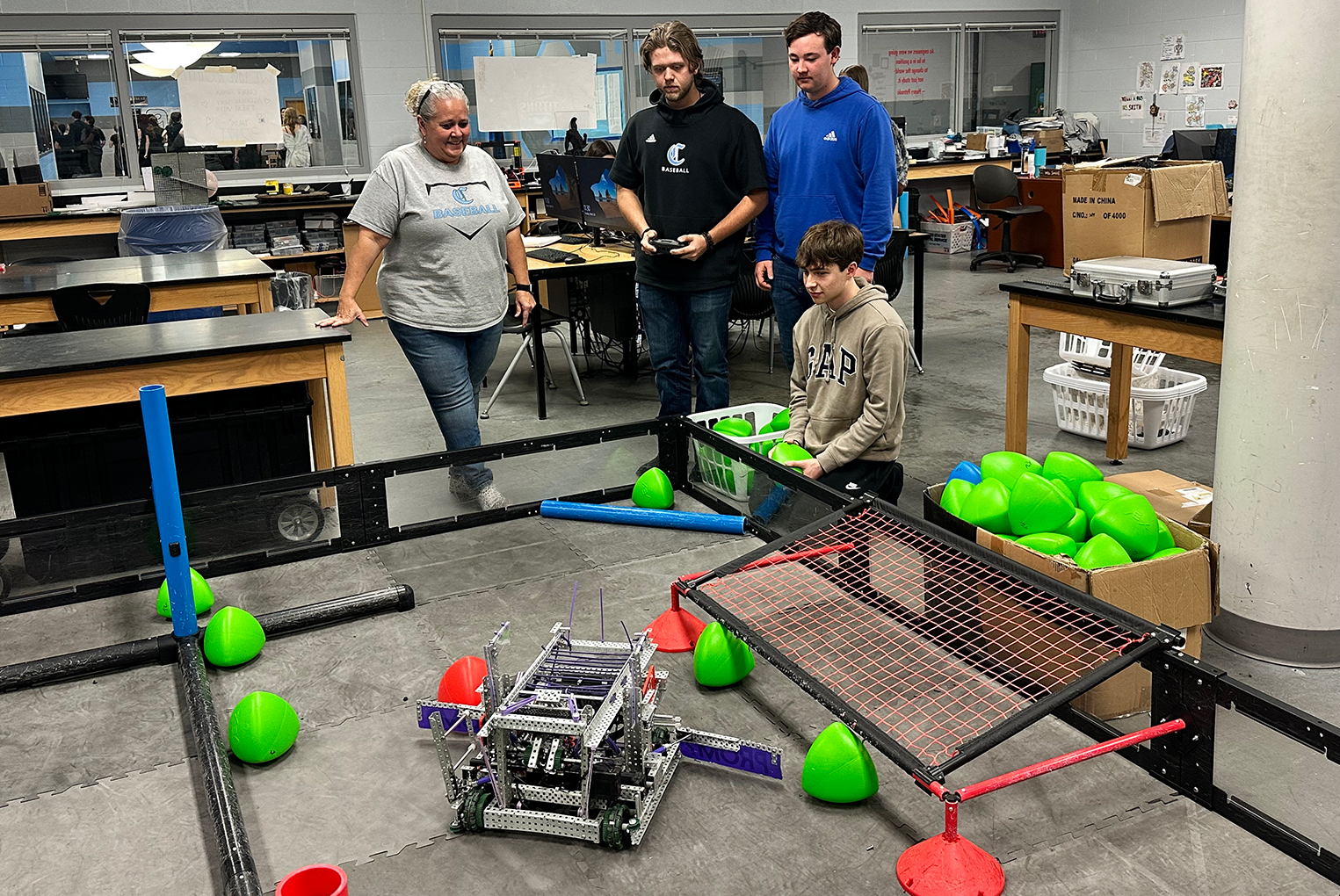
Coordinator for Gifted Education Susan Ryan and language arts teacher Karrie Bal present a book project to Bal’s 7th-grade Target class at T.K. Stone Middle School (Elizabethtown Ind.). Bal, a first-year teacher, teaches three gifted and talented classes. Photo by Amy Wallot, Jan. 17, 2012
By Matthew Tungate
matthew.tungate@education.ky.gov
The 5th-grader had just transferred to the district, and Susan Ryan, coordinator for Gifted Education in the Elizabethtown Independent school district, decided to test her for giftedness because her paperwork did not include an intellectual ability score.
The classroom teachers mentioned that the girl’s parent had been adamant about classroom work being too easy for the student, but they didn’t believe the child was gifted.
“When I tested the student, I was flabbergasted at the number of perfect scores on several of the subtests. She scored higher on that test than any student I have tested to date,” Ryan said.
She found out the girl had been working a grade ahead in mathematics and reading at her previous school. The girls’ teachers changed her schedule so that she was clustered with other gifted students for reading and mathematics, Ryan said.
“The following year, she was the only child in her class to make straight As on a quarterly report card,” she said.
The student confided to Ryan that she was still very uncomfortable being recognized as a smart student, but her level of achievement had definitely rebounded after being identified and spending time with other gifted and talented students.
“For her, spending time with intellectual peers made all the difference in feeling comfortable enough to be herself,” Ryan said.
Kentucky will celebrate Gifted Education Week Feb. 19-25, and educators from some of the leading gifted and talented education schools and districts say the state’s brightest students need extra attention just like the academically neediest students.
“Research is compelling regarding the unmet need of these students in typical classrooms for the majority of their school careers,” said Jan Lanham, principal of Cox’s Creek Elementary School (Nelson County) and president of the Kentucky Association for Gifted Education.
Contrary to prevalent myths, gifted students do not “get it on their own,” and gifted students are at great risk for underachieving, she said.
“The short-term impact of failing to meet the needs of these students is the cumulative failure to put critical skills and knowledge in place (with a negative impact on school accountability performance because schools do not have the distinguished scores that they should),” Lanham said. “The long-term impact is that Kentucky risks the permanent loss of the talents, the creativity and leadership of each of these individuals.
“High-potential students who go unserved may ultimately suffer from pervasive underachievement that prevents their access to higher education and the levels of success we would expect for them.”
Keith Davis, superintendent of the Bullitt County school district, said letting gifted students underachieve would be a tragic loss.
“Gifted education is important for the same reason that education in general is so important. The job of our schools is to equip the next generation of Americans with the tools they need to become the leaders in a global society. We must strive to meet the individual learning needs of all students, and particularly gifted students, because they are even more mentally suited to become our future political and economic leaders,” he said. “Aside from the obvious benefits in higher scores for the schools, the benefits from challenging our highest-ability children accrue mostly to society as a whole. These are the kids who are likely to earn patents, develop scientific breakthroughs or cure the common cold. The world has a lot of problems – we need our smartest people prepared to help solve them.”
Anita Davis, assistant superintendent of the Oldham County school district and no relation to Keith Davis, compares gifted and talented education to coaching.
“Just like athletes, some students are ready to move up, ready for a different level of challenge. Whether they are gifted musicians, mathematicians, writers or basketball players, we need to recognize that these young people need something that matches where they are,” she said. “Our obligation as educators is to maximize individual potential, not push groups of students through a factory-like assembly line education where test scores are the only benchmark of success.”
Several of the educators said schools as a whole benefit from gifted and talented programs.
“As schools/teachers build capacity with each of the gifted services, teachers’ ability to recognize and nurture talents expands, and educators are eager to see the potential in students as opportunities,” Lanham said.

Coordinator for Gifted Education Susan Ryan and language arts teacher Karrie Bal review a lesson plan for a book project Bal’s students will make using LiveBinder software at T.K. Stone Middle School (Elizabethtown Ind.). Photo by Amy Wallot, Jan. 17, 2012
Identifying gifted and talented students
All of the educators identified similar methods of identifying gifted students, citing Kentucky’s gifted and talented regulations.
Ryan said the mainstay of gifted identification in Kentucky rests on having multiple pieces of evidence that suggest giftedness. Students in the cognitive areas must score in the top 4 percent nationally on achievement or intellectual-ability tests, she said.
Students also can be recognized as gifted in creativity, leadership and the visual and performing arts. While the specifics may vary, most of the districts use a combination of tests, teacher evaluations and observations, portfolios of work, and recommendations or nominations.
While Kentucky requires formal gifted and talented services to begin in 4th grade, schools also identify a K-3 talent pool, the educators said.
Services for gifted and talented students
Mary Evans, principal of Cumberland Trace Elementary School (Warren County) and chair of the State Advisory Council for Gifted and Talented Education, said gifted students are not all alike. They vary in general ability, specific aptitudes, interests and predispositions, motivation, and personality, she said.
Her school offers a full-day pull-out for advanced students in mathematics and science, and a partial-day pull-out for other areas where students are given advanced learning opportunities in their areas of strength. Students also receive accelerated and differentiated instruction in the regular classroom.
In the area of leadership, students are coached in how leaders work with others and promote teamwork. Leadership students study famous leaders and serve on the School Leadership Team doing service projects such as Red Cross blood drives and the Veteran’s Day assembly, Evans said.
Students identified in the arts have opportunities to work in small groups with music and visual arts specialists and are invited to showcase their talents in the school and the broader community, she said.
Other schools and districts also use pull-out programs as well as clustering. Ryan said clustering allows gifted and talented students in the same class to receive differentiated instruction.
“Formal, appropriate gifted services shouldn’t be dependent on the presence of a gifted teacher, but should be ongoing and planned in consideration of research and best practice for gifted students,” she said. “That is our aim.”
Anita Davis said Oldham County has a three-prong approach to services.
“This approach is based on the reality that three entities must work in collaboration to properly serve students: the classroom teacher, the school and the district,” she said. “Classroom teachers are responsible for differentiating instruction for students ensuring that students are challenged. The school can provide supports such as making sure students are cluster-grouped and conducting counseling sessions. District staff teaches specialized classes for identified students as well as provide consultation services to classroom teachers.”
Ryan said changes to Kentucky’s academic standards and assessment and accountability system should be boons for gifted education. The idea that all students should be expected to move forward and exhibit continuous improvement has long been at the heart of gifted education, she said.
“Gifted students are truly exceptional learners with exceptional needs,” Ryan said. “Being gifted doesn’t equate to having a trophy or a medal; it is a part of who the student is as an individual. Gifted education is meant to help ensure that those fascinating students who defy intellectual or talent boundaries have learning experiences that help them grow. Every student is entitled to the experience of coming to school each day and learning something new.”
MORE INFO…
Kentucky Association for Gifted Education



Leave A Comment